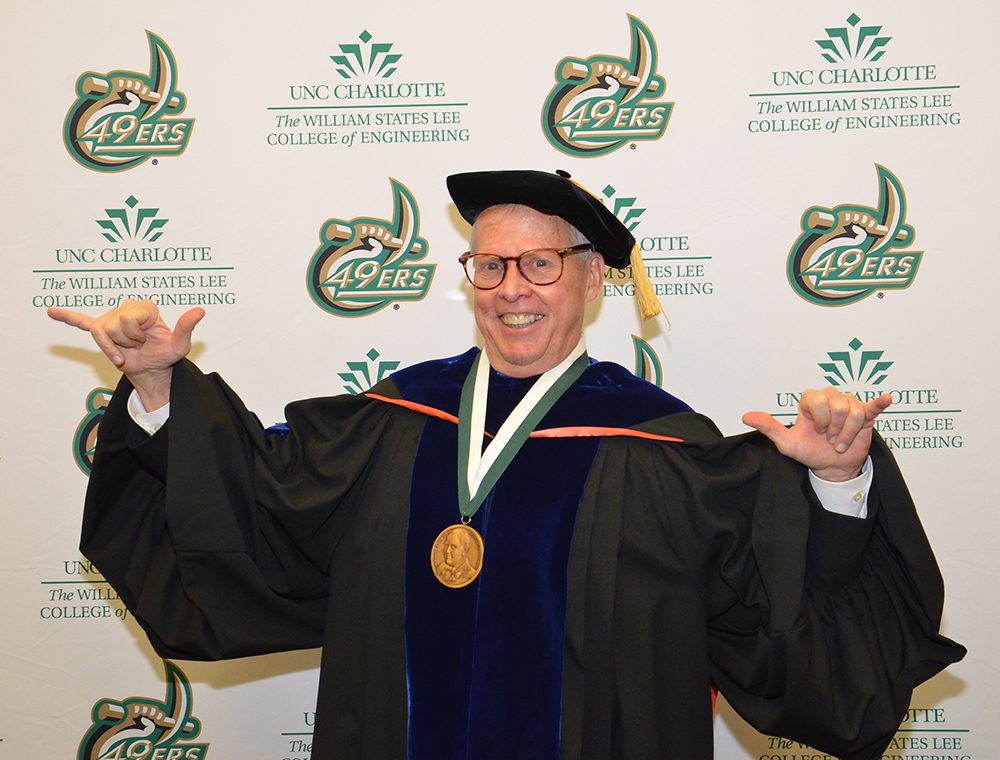During 20 Years in “Best Dean Job in America” Bob Johnson Built, Created, Led

The opportunity to make a difference and the potential to create important academic and research programs are what first attracted Bob Johnson to UNC Charlotte. He made the most of the possibilities, helping The William States Lee of College of Engineering reach record levels of enrollment and research, add new programs, and construct new buildings. Now, after more than two decades, Dr. Johnson is stepping down from what he calls the “best dean job in America.” But he isn’t completely done, as he will be starting a new challenge as a Jefferson Fellow in the U.S. Department of State.
Johnson came to Charlotte in 1994 as department chair of Mechanical Engineering and Engineering Science. Prior to joining UNC Charlotte, he had been faculty member at the University of Illinois for 17 years.
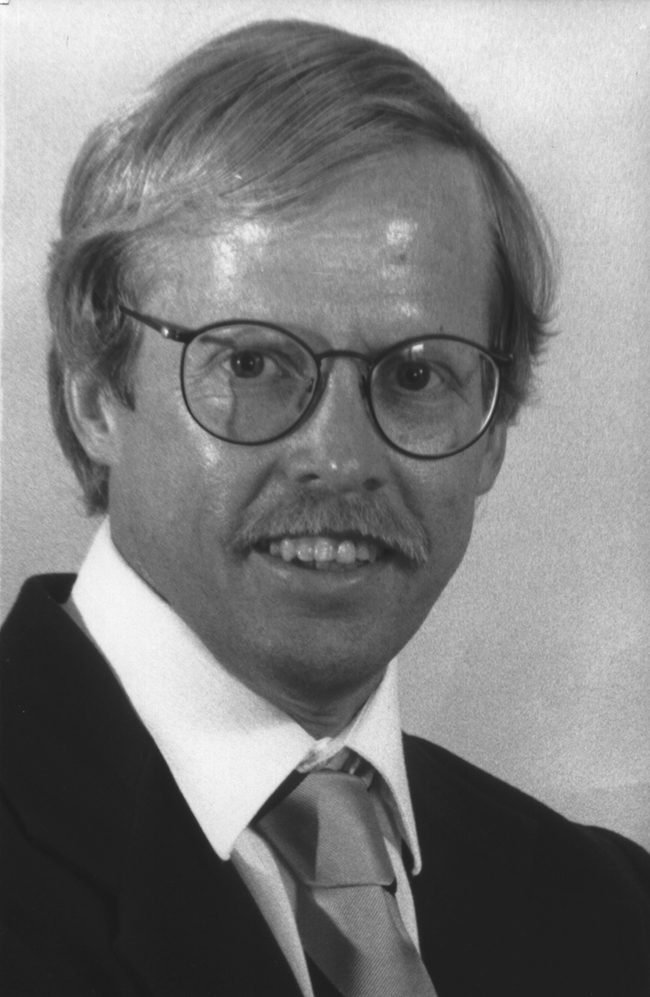 “I attended a NSF conference in Charlotte hosted by the Center for Precision Metrology,” Johnson said. “I could sense the Charlotte area was going to grow like crazy. UNC Charlotte was starting its first Ph.D. programs and the atmosphere here was new and exciting. I always liked starting things, and I saw this as a place I could really make a difference.”
“I attended a NSF conference in Charlotte hosted by the Center for Precision Metrology,” Johnson said. “I could sense the Charlotte area was going to grow like crazy. UNC Charlotte was starting its first Ph.D. programs and the atmosphere here was new and exciting. I always liked starting things, and I saw this as a place I could really make a difference.”
There was an opening for a Mechanical Engineering chair at the time, so Johnson applied, got the job, and made the move to Charlotte.
“The chance to contribute to a place like UNC Charlotte was exciting,” Johnson said. “If you saw an opportunity here, you could go for it.”
Motorsport Engineering
One of first opportunities Dr. Johnson saw while he as department chair was for a program in motorsports engineering.
“I kept bumping into students from all over the country,” he said, “and when I asked them why they were here, they said because of NASCAR and auto racing. We didn’t have any type of program for them at the time, and I saw an opportunity to do something to help them with their career goals, while differentiating ourselves from other universities.”
Johnson wrote a white paper proposing a program in motorsports and automotive engineering, which the university administration approved. At the same time, Dr. Johnson and other Mechanical Engineering faculty were making connections with Charlotte Motor Speedway and local NASCAR race teams. The newly launched program received local and national press, including the cover page of the sports section of the NY Times.
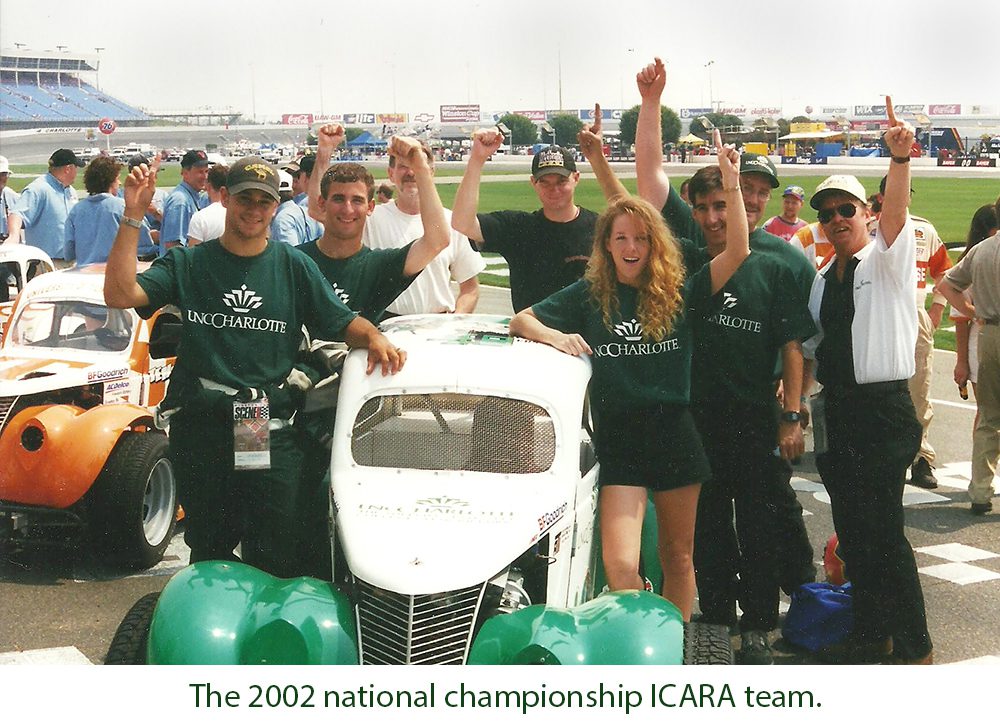 The Speedway’s interest in the program brought with it the dynamic involvement of legendary racing promoter Humpy Wheeler. Wheeler came up with the idea of starting a college auto racing league, and the Inter-Collegiate Auto Racing Association (ICARA) was born.
The Speedway’s interest in the program brought with it the dynamic involvement of legendary racing promoter Humpy Wheeler. Wheeler came up with the idea of starting a college auto racing league, and the Inter-Collegiate Auto Racing Association (ICARA) was born.
Only universities with engineering programs were invited to take part in ICARA. Participating universities included UNC Charlotte, South Carolina, Old Dominion, N.C. State, Duke, Tennessee, and North Carolina A&T. The teams raced 5/8th scale Legends cars at tracks throughout the Southeast.
“The 49er team was dominant (winning every season championship), because we had a bunch of kids with previous experience, and that was a huge advantage,” Johnson said. “They knew about cars, race teams, setup, how to drive, and they worked really well together.”
The ICARA program was expensive, though, and when the economy began to weaken in the mid-2000s most of the teams pulled out. For UNC Charlotte, the educational side of the motorsports program continued to thrive. As the number of students studying motorsports engineering grew, the North Carolina Motorsports and Automotive Research Center was created to support the growing educational and advanced research programs.
Building
In 2000, Johnson became dean of the Lee College of Engineering, succeeding Dr. Robert Snyder, who had served as dean for the previous 23 years.
“When the opportunity opened for the position of dean, I was ready for a new challenge and believed I could make a contribution,” Johnson said. “I thought I would do it for about five to seven years, and it turned into twenty.”
 During his first years as dean, Johnson was involved in the design and planning for new engineering buildings, including the 107,000-square-foot Duke Centennial Hall and the 6,800-square-foot Kulwicki Motorsport Laboratory.
During his first years as dean, Johnson was involved in the design and planning for new engineering buildings, including the 107,000-square-foot Duke Centennial Hall and the 6,800-square-foot Kulwicki Motorsport Laboratory.
“Duke Hall was a significant addition in helping UNC Charlotte with its effort to reach research-level status,” Johnson said. “The building provided important research space for our Center for Precision Metrology and the center’s successful industrial affiliates program.”
The Kulwicki Motorsports Lab was built at the same time as Duke Hall, and became the hands-on laboratory home of the undergraduate motorsport program. To provide space for growing research and graduate studies in motorsports and automotive engineering, the 16,500-square-foot Motorsports Research Building was opened in 2012.
With Johnson as dean, some of the new academic programs that came on line in the 2000s included the Master of Science in Engineering Management, freshman- and sophomore-level classes in Engineering Technology, Bachelor of Science in Systems Engineering, the Infrastructure and Environmental Engineering Ph.D., the Master of Science in Construction and Facilities Management, the Master of Science in Fire Protection and Administration, the Master of Science in Applied Energy and Electro-Mechanical Systems, and the Ph.D. in Civil Engineering.
Research programs and centers started in the 2000s include the Center for Biomedical Engineering and Science; the Infrastructure, Design, Environment and Sustainability Center; the Center for Lean Logistics and Engineered Systems; the Center for Advanced Multimodal Mobility Solutions and Education; and, one of the most significant programs in the history of the college, the Energy Production and Infrastructure Center, better know as EPIC.
EPIC
A brainchild of Johnson’s, EPIC was a response to the need for more engineering professionals in the energy field. The Charlotte region was the home to numerous energy companies including Duke Energy, AREVA, Siemens and Westinghouse, and with an aging workforce, they turned to UNC Charlotte for help.
“Local energy leaders, several of them who were our alumni, approached me about the pending workforce crisis in energy engineering,” Johnson said. “They said they needed all disciplines of engineers, including civil, mechanical and systems, as well as electrical, and wanted to know what we could we do.”
With the backing of the local industry leaders, Johnson first won the support of university administration to pursue an energy engineering program. The next step was to get support at the state level.
 “I arranged for local energy industry executives to visit Raleigh and meet with several state legislators and UNC system administrators,” Johnson said. “This was the big turning point. Every dean in the UNC system had a convincing argument for a new building, a new program and more funding, but having energy executives present my case made all the difference.”
“I arranged for local energy industry executives to visit Raleigh and meet with several state legislators and UNC system administrators,” Johnson said. “This was the big turning point. Every dean in the UNC system had a convincing argument for a new building, a new program and more funding, but having energy executives present my case made all the difference.”
Because of the support of the energy executives, the legislature approved $76 million for a new facility (the EPIC building that opened in 2012) and $5 million in recurring funds to hire 34 additional faculty and staff members.
“From that point, EPIC took off amazingly fast,” Johnson said. “With excellent leadership from the directors we hired and involvement of an active board of advisors, the program steadily added people and research programs.”
EPIC now encompasses seven major laboratories, where faculty and industry partners work on interdisciplinary research. It also has an active board of advisors and affiliates program. And to meet the original request of industry for more energy engineers, every Lee College of Engineering undergraduate program now offers a concentration in energy.
Some of the other college achievements during Johnson’s tenure as dean include enrollment increasing from 1,600 to 4,000 students, dramatic growth in annual research awards from $3 million to $16 million, the Senior Design program expanding to 76 industry-supported projects a year and $650,000 in annual funding, and the engineering Leadership Academy maturing and prospering.
People
“The credit for all of the college’s success belongs solely to the people involved,” Johnson said.
“The people I have been privileged to work with are wonderful, including students, faculty and staff,” he said. “I am from a blue-collar family and was a first-generation traditional college student. Because of that, I always felt I identified with the students here. The kids here work incredibly hard, and I always enjoyed working with them. Our staff have also been fantastic and a joy to work with.”
“Many of the faculty came here for the same reason I did, to get the chance to make a difference. And they did. Look around and see everything they accomplished.”
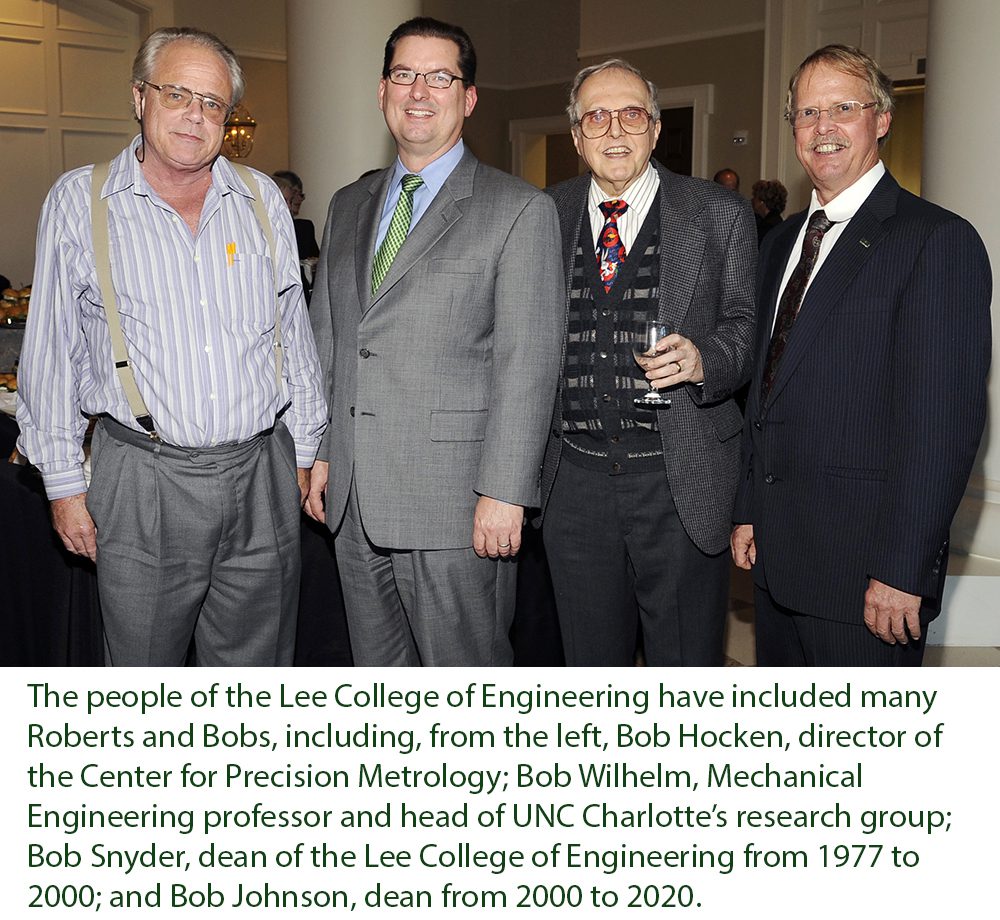 “I came here because of the possibilities, and I got to do more than I ever imagined. The amount of opportunities and the chance to grow new programs was amazing. I truly believe this was the best job in America for a dean.”
“I came here because of the possibilities, and I got to do more than I ever imagined. The amount of opportunities and the chance to grow new programs was amazing. I truly believe this was the best job in America for a dean.”
Johnson is stepping down as dean, but is not retiring completely just yet. Starting this summer, he will begin a one-year National Academy of Science Jefferson Fellowship in Washington D.C. As part of the fellowship, he will be working with the State Department’s Bureau of Ocean and Sciences, Office of Space and Advanced Technologies.
“At this point I’m not exactly sure what I’ll be doing,” Johnson said, “but I’m looking forward to contributing my skills. Following the fellowship, I may come back to UNC Charlotte to teach or perhaps work on special projects.”
Comments About Dean Johnson
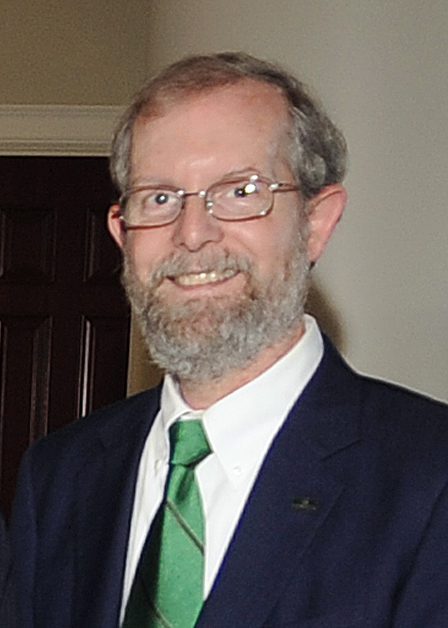 One person who worked closely with Johnson for many years, is Dr. Ron Smelser, the senior associate dean of the Lee College of Engineering. He and Johnson have been colleagues and friends at UNC Charlotte for almost 17 years.
One person who worked closely with Johnson for many years, is Dr. Ron Smelser, the senior associate dean of the Lee College of Engineering. He and Johnson have been colleagues and friends at UNC Charlotte for almost 17 years.
“Bob is one of the best people you could ever work with, and you do work with him, not for him,” Smelser said. “He is kind and interested in people outside of the work environment. He is open to all ideas, and is a big-picture thinker.”
Smelser and Johnson came from similar backgrounds, and shared the goal of seeing the college, the university and those who worked here be successful without worrying about who got credit. “Bob was the right person to guide the college during a period of transition from a teaching institution to a research-focused college,” Smelser said, “and balanced that with excellence in teaching.”
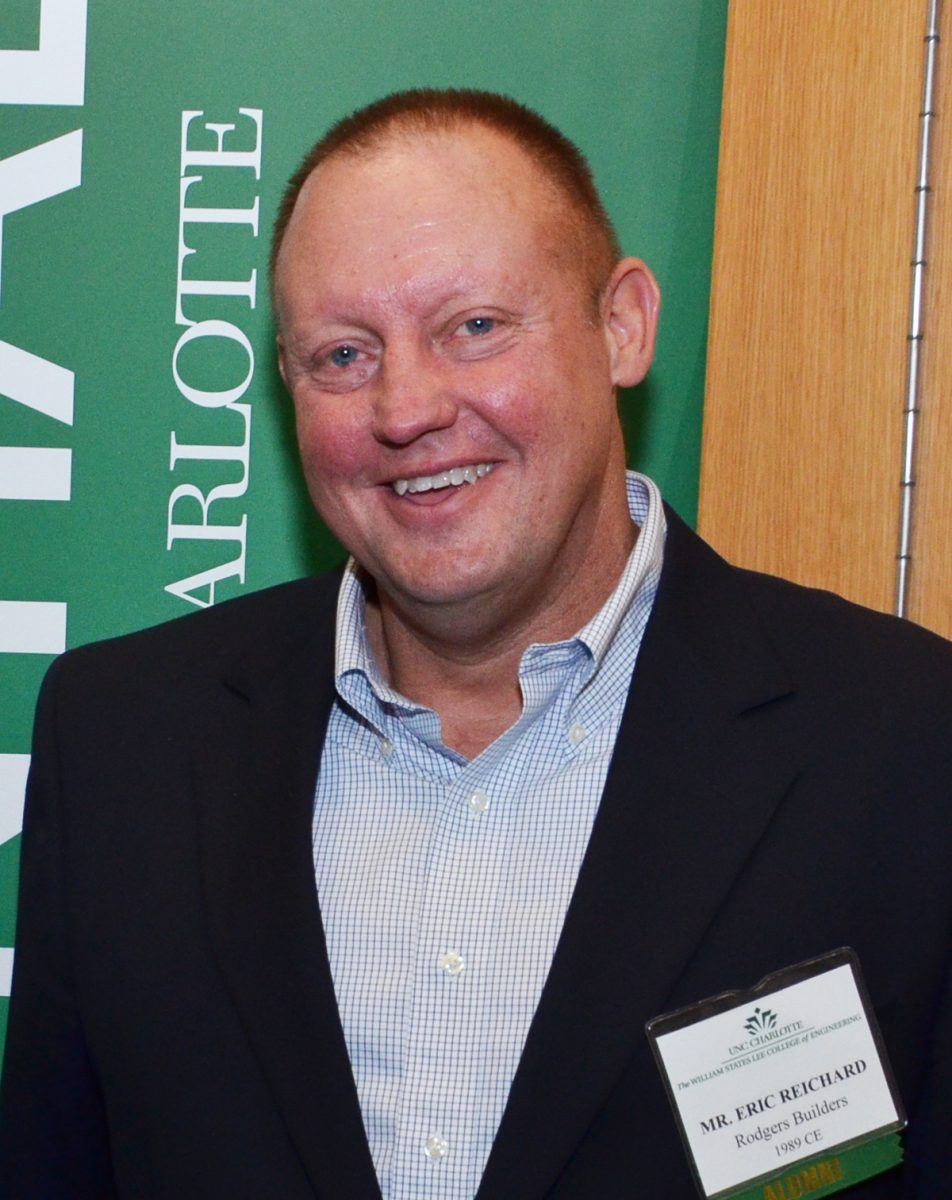 As the current chair of the Lee College of Engineering advisory board, Eric Reichard has been involved with the college since the 1980s, when he was here as a student. Reichard earned his BS in Civil Engineering in 1989, and is now the chief operations officer for Rodgers Builders Inc.
As the current chair of the Lee College of Engineering advisory board, Eric Reichard has been involved with the college since the 1980s, when he was here as a student. Reichard earned his BS in Civil Engineering in 1989, and is now the chief operations officer for Rodgers Builders Inc.
“When I first joined the Board of Advisors, I was blown away by the fact we have 4,000 engineering students on campus,” Reichard said. “Dr. Johnson has done an incredible job of creating opportunities at UNC Charlotte for students interested in all disciplines of engineering. He has also been the leader of many initiatives to create state-of-the-art learning environments for the students such as EPIC.”
“Johnson has a contagious energy that draws people to him,” Reichard said. “He has done incredible work for UNC Charlotte and will certainly be missed. I am glad he is staying on board for a while as his energy, laugh and enthusiasm for Niner Nation is always welcome.”
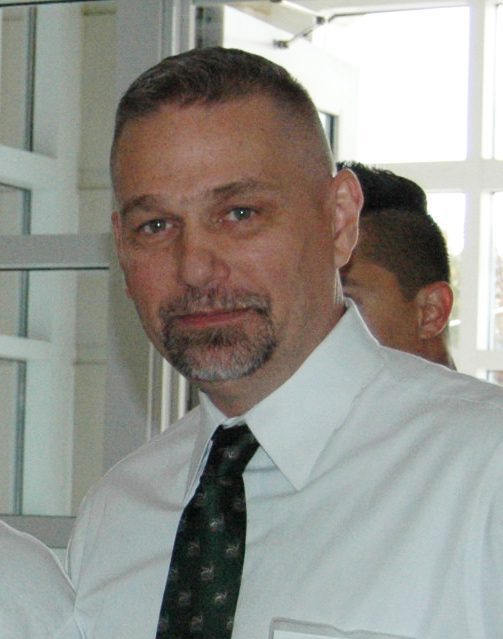 Mark Boomgarden, president and CEO of Moore Nanotechnology Systems and Moore Tool Company, is a 1999 UNC Charlotte electrical engineering graduate. He has been a board member and chair for the Electrical and Computer Engineering Department, and a founding board member of EPIC.
Mark Boomgarden, president and CEO of Moore Nanotechnology Systems and Moore Tool Company, is a 1999 UNC Charlotte electrical engineering graduate. He has been a board member and chair for the Electrical and Computer Engineering Department, and a founding board member of EPIC.
“EPIC is probably the largest accomplishment, with regard to investment and scale, achieved while Bob was dean,” Boomgarden said. “When I was on the ECE board, I met Dhiaa Jamil from Duke Energy, who saw the need for succession planning with Duke’s aging workforce. We brought this issue to Bob Johnson, and that was the very beginning of the Energy Production and Infrastructure Center.”
Increasing student enrollment and expanding engineering programs have had a big impact on many student lives, Boomgarden said. “Bob’s commitment and impact to his job, The William States Lee College of Engineering and the University of North Carolina at Charlotte have been truly significant, as measured through student graduations, faculty recruitment, capital investments and academic leadership. He is a man who has demonstrated his many talents, and I wish him much success as he makes this transition.”
Some of the new programs and major accomplishments of the Lee College of Engineering during Bob Johnson’s time as dean include:
Ph.D. Programs
Infrastructure and Environmental Systems
Civil Engineering
M.S. Programs
Computer Engineering
Engineering Management
Applied Energy and Electromechanical Systems
Construction and Facilities Management
Fire Protection and Safety Management
B.S. Programs
Construction Management
Systems Engineering
Other Academic Initiatives
Four-Year Engineering Technology Programs
Engineering Leadership Academy
Freshman Learning Community
Joint Electrical Engineering Program with Western Carolina University
Motorsports Concentration begun as Chair of ME&ES with continued supervision after becoming Dean
Formed Systems Engineering and Engineering Management Department
Building Construction
Woodward Hall – design
Duke Centennial Hall and Kulwicki Laboratory– design and construction
Motorsports Research Building – design and construction
EPIC – design and construction
College Growth from 2000 to 2020:
Increased Enrollment from 1,400 to 3,870,
Faculty from 90 to 173
Staff from 12 to 68
Annual Research Awards from $3.6 million to $16.5 million
Research Centers
Energy Production and Infrastructure Center (EPIC)
Center for Biomedical Engineering Systems (CBES)
Infrastructure, Design, Environment and Sustainability (IDEaS) Center
NC Motorsports and Automotive Research Center (NCMARC)
Center for Lean Logistics and Engineered Systems (CLLES)
Other College Initiatives
Engineering Leadership Academy
Industrial Solutions Laboratory (Senior Design)
Freshman Learning Community
Engage ME! (Minority Engineers)
WE Engage (Women Engineers)
